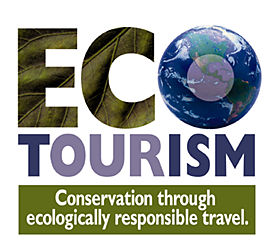Commercial recreation is the rider of recreation-related products or services by private enterprise for a fee, with the long-term intent of being profitable.
Ecotourism
In recent year, ecotourism is one of the fastest growing sub sectors of the tourism industry. It is an industry that stands to make a lot of money from tourists that are seeking environmentally friendly vacations or ecologically friendly activities. It is a form of environmentally responsible tourism that involves travel and visitation to relatively undisturbed natural areas with the object of enjoying, admiring, and studying the nature (the scenery, wild plants and animals), as well as any cultural aspect (both past and present) found in these areas, through a process which promotes conservation, has a low impact on the environment and on culture and favors the active and socioeconomically beneficial involvement of local communities.
Positive Impacts & Principles of Ecotourism
- Minimize impact
Travel to natural, relatively unchanged areas, where natural beauties are the main attraction. It’s a low-impact and small-scale form of travel aimed at avoiding the alteration of each place’s ecosystem
- Seek sustainable development
It contributes to sustainable development which seeks to optimize the present social and economic benefits, without compromising the potential to obtain similar benefits in the future. It is also referred to as ethical tourism because it seeks the well-being of local communities without leaving the appreciation and conservation of the environment aside. It seeks to promote and support the understanding, appreciation and conservation of the environment and culture, raising awareness and producing a feeling of appreciation for biodiversity (emphasizing on the conservation of diverse plant and animal species) and for local cultures (emphasizing on preserving their indigenous features). It is also a suitable means to obtaining economic resources for the conservation of the natural and cultural heritage, supporting local efforts to this end.
- Provide financial benefits and empowerment for local people
It seeks to improve local communities’ welfare, by boosting their economic and social development, creating economic opportunities which in turn will produce sustainable benefits in time. Therefore, it is an activity which promotes employment as well as economic and social development, acting as an alternative income source for social sectors living in hard economic situations.
- Build environmental and cultural awareness and respect
It seeks to educate travelers on conservation of the environment and respect for different cultures. It also pursues the creation of an ecological conscience, encouraging more activism among visitors so that they become enthusiastic and effective conservation agents.
Disadvantages of Ecotourism
- Compromising of land
Converting undeveloped land into profitable space for tourism is one disadvantage. National parks and wilderness areas may be compromised by an influx of tourists.
- Residents may leave
Ecotourism may displace some local residents. They either won’t be able to afford to stay, or they may be forced by developers to leave.
- Cultural insensitivity
The industry of ecotourism attracts upper-class, urban tourists who may not be culturally sensitive and may alienate the local residents.
- Lack of income prospects
Ecotourism jobs for local residents often don’t pay well. And profits may spill into other nations’ pockets as wealthy investors gain from the success of an ecotourism project.








